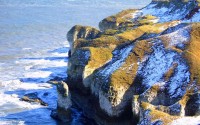Dynamic energetic coast: the East Riding
- Date
- 10 Nov 2015
- Start time
- 7:30 PM
- Venue
- Tempest Anderson Hall
- Speaker
- Dr Robb Robinson

Dr Robb Robinson, Maritime Historical Studies Centre, University of Hull
Heritage is an increasingly important component in terms of tourism, business opportunities and growth. Many regions of the country and coast around the British Isles make much of their distinctive local heritage and cultural dimensions in business terms.
This presentation, the outcome of Dr Robinsons historical research for the Seawards Heritage project supported by the Holderness Fisheries Local Action Group, the East Riding of Yorkshire Council and the MMO, will outline something of the rich maritime and remarkable fisheries history and somewhat unknown heritage of the Holderness coastline and Bridlington Bay area. It will update on some recent heritage developments including the new Bridlington Harbour interactive Maritime Heritage Trail – which is scheduled to be opened at the end of October, 2015.
The author of four books and numerous articles, Dr Robb Robinson is based at the Maritime Historical Studies Centre, University of Hull, and was recently involved in the BBCs World War One at Home project.
Member’s report
Dr Robinson used a variety of materials, including personal and historical photographs, maps and charts to illustrate change in this region over the last two millennia, including spectacular coastal erosion. Fishing has been a major source of income throughout, though the type of fish taken has changed, from eels in the old glacial meres to herring, cod and now lobster. The wealth generated sometimes led to armed struggle, including the 1260 dispute between monks from Meaux Abbey, near Hull, and St Mary’s Abbey York, which was settled by ‘trial by combat’ in favour of York. Dr. Robinson showed images of many types of fishing boat, and explained the skills and strength needed not only by the fishermen, but also by the women they chose for their wives. The dangers of this coast, particularly in the winter months, led to Bridlington being designated a ‘Harbour of Refuge’. The town is now promoting its rich heritage to the developing tourist industry.
Margaret Leonard